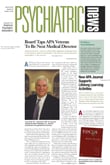Psychiatric News introduces a new feature—a monthly column that reports on regulatory and legal actions, news from the drug industry, and reports from clinicians and researchers involving psychotropic medications. We welcome your feedback at
[email protected].
Regulatory Briefs
• As this column was going to press, a federal district judge in Los Angeles was still reconsidering her previous order to GlaxoSmithKline (GSK) to halt TV commercials for its leading antidepressant Paxil (paroxetine). After both the Food and Drug Administration (FDA) and Department of Justice openly criticized her ruling, saying she was overstepping her authority and encroaching upon the sole regulatory authority of the FDA to approve drug advertising, the judge stayed the order, allowing the FDA to submit a brief in the case. The ads in question, say a group suing GSK in this particular case, are misleading because they claim that Paxil is “not habit forming.” The case is important legally, both as a challenge to the FDA’s authority over drug advertising and in addressing the question of whether discontinuation symptoms associated with Paxil (and other SSRIs) constitute actual withdrawal, indicating that the drug may have addictive potential.
• GSK announced last month that it is asking the FDA to approve a first-ever indication for “the long-term management of bipolar I disorder to delay the relapse/recurrence of depressive episodes” for its anti-seizure drug, Lamictal (lamotrigine). In a supplemental new drug application (sNDA), the company supported the new indication with two 18-month studies of nearly 650 adults with bipolar I disorder. In both studies, Lamictal significantly delayed the relapse/recurrence of mood episodes, particularly depressive episodes.
• Forest Laboratories announced that its sNDA on its new antidepressant Lexapro (escitalopram) has been approved by the FDA. The approval adds the indication “for the long-term maintenance treatment of major depressive disorder” to the Lexapro label.
• Bristol-Myers Squibb Co. and codeveloper Otsuka Pharmaceutical Co. announced the receipt of an approvable letter on the long-awaited “next generation” of schizophrenia medications, aripiprazole. The FDA issued the approvable letter but did not approve the proposed trade name of Abilitat. Analysts suspect the name is too close to Adalat—Bayer Corp.’s brand of the calcium channel blocker nifedipine, which is used for hypertension. Although it appears the Abilitat name will pass European muster, the company and the FDA are looking at the name Abilify.
• Eli Lilly and Co. last month received an approvable letter for its new ADHD drug, Strattera (atomoxetine.) The company said the approval is “contingent on labeling discussions” and more significantly on “submission of additional data or analysis from either existing studies or a potential new study.” Lilly still hopes to debut the new drug in spring 2003; however, industry analysts are wondering whether the FDA’s unspecified concerns would be satisfied that quickly.
• Pfizer acknowledged last month that it will be delaying its new drug application on pregabalin for generalized anxiety disorder while it conducts additional clinical studies on the drug’s safety. The company had hoped to have the drug to the FDA by the end of this year, but now expects to submit the drug to European regulators in spring 2003 and then to the FDA “sometime after that.” A spokesperson for Pfizer would not comment on what issues would be addressed in the new trials.
• A new drug application for memantine, Forest Labs’ new drug for moderate-to-severe Alzheimer’s disease, was filed with the FDA in July, and there are three additional clinical trials in progress, The drug appears to benefit patients’ function and cognitive skills significantly when added to existing donepezil therapy. In a company-funded six-month trial of more than 400 patients, 20 mg of memantine added to donepezil provided significant improvements as measured by the ADCS-ADL, SIB and CIBIC-Plus assessment tools, compared with donepezil plus placebo.
Research Briefs
• Lithium has the most published supportive evidence in the treatment of conduct disorder, followed by conventional neuroleptics and atypical neuroleptics, according to a European review of both controlled and open trials of medications to treat young people for conduct disorder. The authors cautioned, however, that evidence in each case is limited.
(Eur Neuropsychopharm200212: 361-370.)
• Risperidone appears to be effective and well tolerated to control severe disruptive behaviors like aggression and destructive behavior in children with below-average IQs. In a company-funded study, the atypical antipsychotic was shown to reduce problem behaviors by nearly 50 percent, compared with a 20 percent reduction with placebo.
(J Am Acad Child Adol Psychiatry200241:1026-1036.)
• Paroxetine, long thought of as a “simple SSRI,” may actually be a dual reuptake inhibitor after all, potentially explaining its wide application in various mood disorders. In a company-funded study, researchers found that paroxetine at common clinical doses decreased norepinephrine reuptake by roughly 30 percent while blocking nearly 75 percent of serotonin reuptake. At higher doses norepinephrine reuptake was blocked by 43 percent. This is one of the first studies to show dual reuptake capability in human subjects taking oral doses. Previous studies had shown the effect in animals.
(Am J Psychiatry2002159:1702-1710.)
• Citalopram (Forest Labs’ Celexa) given intravenously appears to be a safe and effective way to control overwhelming symptoms in treatment-resistant obsessive-compulsive disorder. Nearly 60 percent of patients in the company-funded study showed YBOCS score decreases of greater than 25 percent within 21 days.
(J Clin Psychiatry200263: 796-801.)
• Sertraline dosing may need to be adjusted in adolescents, according to a new study from the National Institute of Mental Health. Because the half-life of the drug is dose dependent (half-life increases as dose increases) and is significantly shorter from the first dose to steady state, adolescents may need twice-a-day dosing. The study also suggested that most adolescents will need doses higher than 50mg/day to achieve a therapeutic effect.
(J Am Acad Child Adol Psychiatry200241: 1037-1044.) ▪
